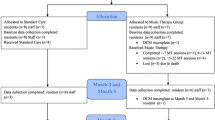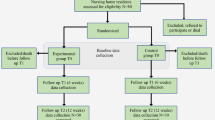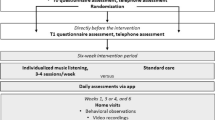Abstract
This commentary is meant to provide some food for thought about the concept of the underlying mechanisms of music therapy in dementia and mental health care. It introduces what the term “mechanism” usually indicates in music therapy (MT) research literature. Then it highlights the need to consider multiple types of evidence when referring/one refers to “underlying mechanism” in music therapy research and provides a reference to an investigation about of the role of music therapy in reducing behavioural issues with dementia clients, where a mixed method is used to describe the multifaceted nature of these underlying mechanisms.
Access this chapter
Tax calculation will be finalised at checkout
Purchases are for personal use only
Similar content being viewed by others
References
Legge AW. On the neural mechanisms of music therapy in mental health care: literature review and clinical implications. MTPERS. 2015;33:128–41. https://doi.org/10.1093/mtp/miv025.
Mastnak W. Perinatal music therapy and antenatal music classes: principles, mechanisms, and benefits. J Perinat Educ. 2016;25:184–92. https://doi.org/10.1891/1058-1243.25.3.184.
Juslin PN, Harmat L, Eerola T. What makes music emotionally significant? Exploring the underlying mechanisms. Psychol Music. 2014;42:599–623. https://doi.org/10.1177/0305735613484548.
Robson C. Real world research: a resource for users of social research methods in applied settings. Chichester, West Sussex: Wiley; 2011.
Hallam S, Cross I, Thaut M. The Oxford handbook of music psychology. Oxford: University Press, Incorporated; 2018.
Juslin PN, Västfjäll D. Emotional responses to music: the need to consider underlying mechanisms. Behav Brain Sci. 2008;31:559–75. https://doi.org/10.1017/S0140525X08005293.
Fang R, Ye S, Huangfu J, Calimag DP. Music therapy is a potential intervention for cognition of Alzheimer’s disease: a mini-review. Transl Neurodegener. 2017;6 https://doi.org/10.1186/s40035-017-0073-9.
Clements-Cortes A, Bartel L. Are we doing more than we know? Possible mechanisms of response to music therapy. Front Med. 2018;5 https://doi.org/10.3389/fmed.2018.00255.
Thaut MH, McIntosh GC, Hoemberg V. Neurobiological foundations of neurologic music therapy: rhythmic entrainment and the motor system. Front Psychol. 2015;5 https://doi.org/10.3389/fpsyg.2014.01185.
Fachner J. The future of music therapy and neuroscience. In: Di Leo C, editor. Envisioning the future of music therapy. Philadelphia, PA: Temple University; 2016. p. 139–48.
Fachner J, Gold C, Erkkilä J. Music therapy modulates fronto-temporal activity in rest-EEG in depressed clients. Brain Topogr. 2013;26:338–54. https://doi.org/10.1007/s10548-012-0254-x.
Craver C, Tabery J. Mechanisms in science. In: Zalta EN, editor. The Stanford encyclopedia of philosophy, summer 2019. Stanford: Metaphysics Research Lab, Stanford University; 2019. https://plato.stanford.edu/archives/sum2019/entries/science-mechanisms/. Accessed 3 Sept 2020.
Vink AC, Bruinsma MS, Scholten RJ. Music therapy for people with dementia. Cochrane Database Syst Rev. 2011;(3) https://doi.org/10.1002/14651858.CD003477.pub2.
van der Steen JT, van Soest-Poortvliet MC, van der Wouden JC, Bruinsma MS, Scholten RJ, Vink AC. Music-based therapeutic interventions for people with dementia. In: The Cochrane Collaboration, editor. Cochrane database of systematic reviews. Chichester, UK: John Wiley & Sons, Ltd; 2017. https://doi.org/10.1002/14651858.CD003477.pub3.
Schall A, Haberstroh J, Pantel J. Time series analysis of individual music therapy in dementia: effects on communication behavior and emotional well-being. GeroPsych. 2015;28:113–22. https://doi.org/10.1024/1662-9647/a000123.
McDermott O, Crellin N, Ridder HM, Orrell M. Music therapy in dementia: a narrative synthesis systematic review. Int J Geriatr Psychiatry. 2012; https://doi.org/10.1002/gps.3895.
Vasionytė I, Madison G. Musical intervention for patients with dementia: a meta-analysis. J Clin Nurs. 2013;22:1203–16. https://doi.org/10.1111/jocn.12166.
Gold C, Eickholt J, Assmus J, Stige B, Wake JD, Baker FA, Tamplin J, Clark I, Lee Y-EC, Jacobsen SL, Ridder HMO, Kreutz G, Muthesius D, Wosch T, Ceccato E, Raglio A, Ruggeri M, Vink A, Zuidema S, Odell-Miller H, Orrell M, Schneider J, Kubiak C, Romeo R, Geretsegger M. Music Interventions for Dementia and Depression in ELderly care (MIDDEL): protocol and statistical analysis plan for a multinational cluster-randomised trial. BMJ Open. 2019;9:e023436. https://doi.org/10.1136/bmjopen-2018-023436.
Hsu MH, Flowerdew R, Parker M, Fachner J, Odell-Miller H. Individual music therapy for managing neuropsychiatric symptoms for people with dementia and their carers: a cluster randomised controlled feasibility study. BMC Geriatr. 2015;15:84. https://doi.org/10.1186/s12877-015-0082-4.
Pizziolo P. Investigating the role of music therapy in the reduction of behavioural and psychological symptoms for people with dementia. Doctoral dissertation, Anglia Ruskin University. 2019. https://arro.anglia.ac.uk/id/eprint/706018/. Accessed 4 Nov 2020.
Bruscia KE. Improvisational models of music therapy. Springfield, IL: C.C. Thomas; 1987.
Author information
Authors and Affiliations
Editor information
Editors and Affiliations
Rights and permissions
Copyright information
© 2021 Springer Nature Switzerland AG
About this chapter
Cite this chapter
Pizziolo, P. (2021). Introducing Mechanisms of Music Therapy for People with Dementia: A Commentary to Music Therapy Chapter by Carr and Windle. In: Volpe, U. (eds) Arts Therapies in Psychiatric Rehabilitation. Springer, Cham. https://doi.org/10.1007/978-3-030-76208-7_10
Download citation
DOI: https://doi.org/10.1007/978-3-030-76208-7_10
Published:
Publisher Name: Springer, Cham
Print ISBN: 978-3-030-76207-0
Online ISBN: 978-3-030-76208-7
eBook Packages: MedicineMedicine (R0)




